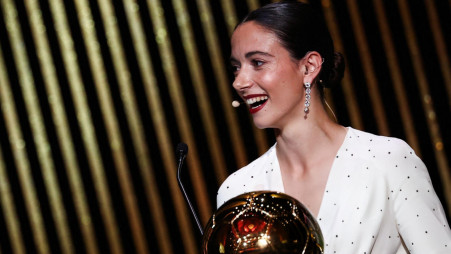Among the Parisian glitz and glamour, Aitana Bonmatí wrote herself into the headlines once again. As she was called to the stage to win her second Ballon d’Or Féminin award, the iconic Spaniard continues her reign at the very top of the women’s game. It was somewhat apt that she received her trophy from Natalie Portman, a sprinkling of Hollywood stardust to top the occasion.
There is no doubt that the 26-year-old midfield magician continued to be at the height of her powers as Barcelona dominated the European stage. I wrote in my Ballon d’Or piece last year that watching her play is a privilege and that sentiment has not waned. Over the course of last season, she was quite literally at the heart of her club’s success as they picked up every domestic trophy available (the Liga F title, the Copa de la Reina and Supercopa). She added another Champions League win to her collection and was named UWCL player of the season. Silverware also came for her country as Spain lifted the inaugural Nations League back in February and she was named player of the match in the final against France.
Bonmatí credited her teammates for her success and they were one of the first things she mentioned in her acceptance speech. “I always say this is not something that you can do alone,” she said. “I’m so lucky to be surrounded by wonderful players who help me to keep growing into a better player.”
Bonmatí will have known this time around that her teammates will have unquestionably run her close. Barcelona players locked out the top three with Caroline Graham Hansen coming second and Salma Paralluelo third. It was perhaps the strongest challenge for the Ballon d’Or accolade there has ever been, an indication of the sport’s ever-increasing quality.
Graham Hansen, in particular, would have been an equally deserving winner. The Norwegian winger, with her dazzling feet and instinctive eye for goal, has inexplicably long been ignored at these award ceremonies. Her performances for Barcelona have been eye-catching and an omission from the shortlist this time around would have been sacrilege. During the 2023-24 season, she amassed 32 goals and 28 assists in 40 matches across all competitions and finished top scorer in Liga F. Where she perhaps falls away compared to Bonmatí is with her national team – not in her performances for her country per se but in the results that Norway achieve on the world stage.
As women’s football continues to prosper, another award was finally added to the ceremony. The long overdue introduction of women’s coach of the year is much welcomed and the winner seemingly inevitable.

In Emma Hayes, the women’s game has one of a kind. After ending her more than a decade-long tenure as Chelsea manager in May with a seventh WSL trophy (their fifth domestic title in a row), Hayes took over at the helm of the US. After just 84 days in charge, she guided her team to the top of the podium in Paris as the US won their first Olympic gold since 2012. Barcelona’s Jonatan Giráldez will consider himself a little unlucky after he guided his side to a clean sweep on trophies but Hayes’s achievements over the past 12 months are exceptional.
In among the celebrations there were two other awards. Barcelona were inevitably named club of the year while Jenni Hermoso took home the Sócrates Award for her humanitarian work. It provided a particularly satisfying moment for the Spanish forward to be recognised with a standing ovation for her bravery in the aftermath of the Luis Rubiales World Cup incident.
Still, however, problems with the Ballon d’Or rumble on with the sense that, to some degree, women’s football remains an afterthought. There was a strong sense of dejá vu in the timing of the ceremony, once again placed in the middle of an international break meaning that many of the world’s best players and coaches were unable to attend. There are also still too few awards on the female side. The equivalent of the Yashin Trophy celebrating goalkeepers remains conspicuously absent while there are also no awards for young player of the year or top scorer.
There is an urgency to the calls for women to be better represented. The introduction of a Ballon D’Or Féminin six years ago was much welcomed but the game has sky-rocketed in that time and progress in the ways it and its players are celebrated must continue too.








More Stories
Amorim insists Fernandes not leaving Manchester United amid Madrid reports
How debt burden pushed Nigerian boxer Segun Olanrewaju to a fight that took his life
Nigeria Taekwondo Federation boss, Abdullahi Saidu dies at 53